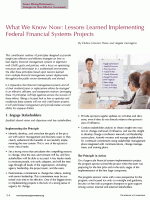
What We Know Now: Ensuring Success for the Government's Financial Systems

 Improving the cost, quality, and performance of financial management operations and systems is one of the Obama’s administration’s top management priorities. While the financial management community has made significant progress over the years, it continues to face challenges in meeting some of the basic standards for accounting and reporting. Many agencies currently use outdated financial systems that do not support their efforts to improve financial performance and accountability. Efforts made to improve financial systems through upgrades or replacement of current financial systems must be undertaken with planning and care.
Improving the cost, quality, and performance of financial management operations and systems is one of the Obama’s administration’s top management priorities. While the financial management community has made significant progress over the years, it continues to face challenges in meeting some of the basic standards for accounting and reporting. Many agencies currently use outdated financial systems that do not support their efforts to improve financial performance and accountability. Efforts made to improve financial systems through upgrades or replacement of current financial systems must be undertaken with planning and care.
OMB Memorandum 10–26 (www.whitehouse.gov/sites/default/files/omb/assets/memoranda_2010/m-10-26.pdf) laid out key elements of a forward-looking policy on reform of financial management reform. To help the government implement the OMB policies, IBM drew lessons from our work on multiple financial management system deployments with government and commercial clients; our analysis of these lessons pointed to ten principles that, if implemented, would improve results and reduce risks in financial systems implementations.
The ten principles are:
1. Engage Stakeholders – Establish shared vision and objectives with key stakeholders.
2. Simplify Processes -- Streamline business processes and take advantage of commercial-off-the-shelf (COTS) software functionality and workflow.
3. Plan Acquisitions -- Understand requirements, their connection to the mission, and how to mitigate risks in delivering the system.
4. Tighten Scope -- Deliver functionality in phased, successive “chunks” targeting specific processes and outcomes.
5. Commit Resources -- Plan and deploy appropriate resources throughout the entire life cycle to fulfill project requirements.
6. Manage Proactively -- Employ a rigorous and robust project management approach exercised by qualified program managers.
7. Work Together -- Facilitate and sustain open dialogue among government stakeholders to create a partnership with software vendors and system integrators.
8. Guide Change -- Provide stakeholders the right information at the right time throughout the entire life cycle of the effort.
9. Conduct Reviews - Pay continuous attention to proactive and disciplined risk, communication, and quality management activities to enable project success.
10. Test Thoroughly -- Dry run data conversion, test business processes end-to-end, and involve users across all levels of the organization in “real life” testing.
IBM’s White Paper ,“What We Know Now: A Look into Lessons Learned Implementing Federal Financial Systems Projects” (www.businessofgovernment.org/sites/default/files/Forum_FM.pdf), provides more detail on each of these principles, as well as giving specifics on implementation and examples of where the principle has been implemented successfully in practice.
It is imperative that financial management systems and their modernization or replacement efforts be managed in an effective, efficient, and transparent manner. Leveraging the ten principles outlined in the IBM White Paper will help agencies increase the likelihood of success in these efforts.



